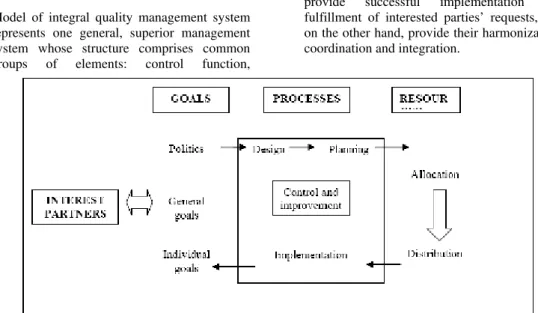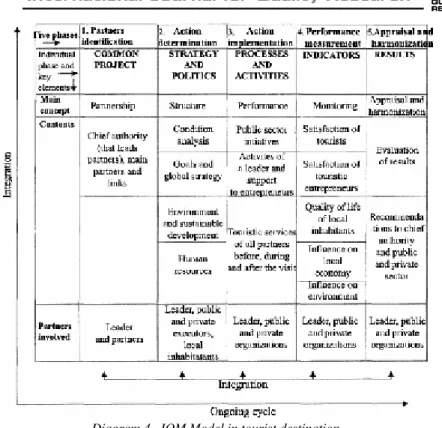International Journal for Quality research UDK - 005:338.48
Professional Paper (1.04)
Vodoje Vujic
Faculty for touristic and
hotel management, Opatija,
Croatia
Implementation Of Integral System Of Quality
Management In Tourism
Abstract:
Theory and practice have corroborated the need
and usefulness of an integral approach to quality
management in tourist destinations, since the destination
and its touristic offer define a number of disparate
participants and interested parties. An integral system of
quality management is one of the models of touristic
management that with the implementation of contemporary
principles strives to achieve business excellence and
competitory advantage. The paper determines and projects
the need and importance of implementing an integral
system and accordingly seeks to form a model for its
development. By studying the oneness of the whole we have
established the dependence and firm connections between
particular norms and elements, and by analyzing them in
this paper we describe the structure and associated
characteristics of the whole.
Keywords: management, tourism, implementation, system
of quality
1.
MODELS
OF
QUALITY
MANANGEMENT SYSTEMS
International norms create models of certain management systems that represent a particular «tool» for help and support of management in configuring and improvement of the company organization, employees’ awareness of certain specific issues and improvement of the company’s base of knowledge. Models represent a pragmatic solution for modeling of contemporary management systems, and in wide area of application, in different industries and economic sectors. Their philosophy refers to the standpoint that top results cannot be achieved without quality management, which demands founding of quality organization and system, ascertainment of responsibilities and authorizations, defining of appropriate everyday work and development and continued monitoring, appraisal and improvement of achieved results. Thereby planned management of a certain aspect at strategic level is achieved
and integrated into entire business goals. These models are results of the norm internationalization and their goal is to simplify trade, exchange, and transfer of technology among business systems. As elements of the integral quality management system model in tourism, we chose five models such as follows:
Model of quality management system according to the international norm ISO 9001
Model of environmental management system according to the international norm ISO 14001
Model of management system of health and safety of employees according to the international norm OHSAS 18001
Model of management system of corporation public responsibility according to the international norm SA 8000.
Model of integral quality management system represents one general, superior management system whose structure comprises common groups of elements: control function,
production process and elements of certain systems that are specific for the particular functional aspect. Model of integral quality management system should, on the one hand, provide successful implementation and fulfillment of interested parties’ requests, and on the other hand, provide their harmonization, coordination and integration.
Diagram 1. Concept of integral quality management system
Concept of the integral quality management system, displayed in Diagram 1., is based on elements of application of the system theory. It is a system established as a group of mutually related processes that share the same set of resources and realize common goals, which are linked with satisfaction of all interested parties. In that way, we get a foundation for construction of the integral quality management system.
Management of goals, management of processes and management of resources make key areas of the integral quality management system and represent the way of its operation in a company. Therefore, key processes are: establishment of goals, planning and design of processes, supply and allocation of resources, implementation and work control and appraisal and evaluation of goals, which makes one complete cycle based on PDCA approach (plan, deploy or act, check or control, advance or improve). The same approach is going on within every area of
comes to specific requests of a single norm they can be left as components, or can be integrated
within every one of the six main elements of the integral quality management system.
2.
INTEGRAL
QUALITY
MANAGEMENT
IN
TOURIST
DESTINATIONS
Destination and its tourist offer are composed of several different participators and carriers. Their common goal is to realize environmental quality; satisfaction of tourists, satisfaction of local touristic industry and quality life of their inhabitants. Conception of Integral Quality Management (IQM) ensues the common goal, and integrates all carriers of tourist offer in destination with the intention of realizing top quality and the biggest tourist efficiency.
Integral Quality Management (IQM) is the optimal concept and model of quality management in tourism, because it integrates all elements of quality tourism within itself. IQM enables satisfaction of ever increasing needs, requests and expectations of modern tourists. At the same time, it provides balanced and sustainable
tourist development.
IQM has its strategic and operative time dimension, since quality becomes a strategy that is realized through particular phases and annual plans. International standards of every touristic product that provide for satisfaction and perception of tourists make the foundation of quality. Tourist is a center of interests in IQM, because his satisfaction results in bigger financial results of tourist organizations, but only with assurance of satisfaction of local inhabitants and protection of environment. Satisfied tourist comes back at the same destination and he is a carrier of the best tourist promotion. IQM leans on theory and practice of Total Quality Management (TQM), but it is wider and more universal, because it finds a balance of a number of various interests and goals of different interested parties in tourist destination. Integrated approach to quality management of a certain destination is best illustrated in Diagram 2.
New approach to management of development has been used recently all over the world, based on evaluation of reception potential and impact on environment. It is necessary to constantly research, measure and coordinate expectations of tourists before the arrival and perception of tourists after the departure. IQM entirely satisfies a dynamic approach to planning of sustainable development and new trends in tourist demand. Considering that quality and its constant improvement are primary motivated by the increase of tourist satisfaction it is
useful to point to the business goal and quality that reflect by tourist satisfaction. Tourist satisfaction can be observed in five phases of quality (expected, perceived, given, wanted and quality prescribed by business system), but there is a "gap" and variation between each of these phases. The goal is to eliminate the difference, to level the ''gap'' as much as possible and to bond particular phases. Diagram 3 visually presents basic elements of satisfaction of quality management and other participants in tourist destination.
Diagram 3. Elements of quality management of tourist destination
From Diagram 3, we can observe that there are a number of considerations and interests such as: interests and satisfaction of entrepreneurs, management, employees, guests, inhabitants and society, that should be coordinated and also to find a quality that shall satisfy all interested parties and their interests because it is the only way to achieve business excellence of every tourist destination. When it comes to business excellence and the model of sustainable development of tourism, it should be noted
that sustainable development of tourism is based on consideration of the following three components:
Ecological sustainability, Socio-cultural sustainability, Economical sustainability
Diagram 4. IQM Model in tourist destination
Source: Master Plan of tourist development of Primorsko-goranska County, University of Rijeka, 2005.
Certain phases and their elements from a Diagram 4, indicate that IQM, as a model of development of tourist destination, is possible
and applicable providing support, integration and cooperation of all structures in its fields.
3. CONCLUSION
Integral quality management system represents a complex concept with the purpose of ensuring efficient operation and development of tourist destination in the long term, provided that managing activities are focused on different interest groups including customers, employees, suppliers, and investors, local and global community. Their satisfaction is a key for business success. Connection of their relationship and pleasure forms a total integral
management system at the level of individual tourist destination with certain functions and operating principles.
REFERENCES:
[1] Avelini Holjevac, I.: Upravljanje kvalitetom u turizmu i hotelskoj industriji, Sveučilište u Rijeci – Fakultet za turistički i hotelski menadžment, Opatija, 2002.
[2] Deming, E. W.: Out of Crisis, MIT – Centre for Advanced education services, Cambridge, 2000.
[3] Glavni plan razvoja turizma Primorsko-goranske županije, Sveučilište u Rijeci, 2005. [4] Injac, N.: Mala enciklopedija kvalitete – okoliš i njegova zaštita, IV dio, OSCAR, Zagreb,
2004.
[5] Smolčić Jurdana, D.: Načela održivog razvoja turizma u knjizi Održivi razvoj turizma, Fakultet za turistički i hotelski menadžment, 2005.
[6] Vujić, V.: Menadžment ljudskog kapitala, Sveučilište u Rijeci – Fakultet za turistički i hotelski menadžment, Opatija, 2005.
[7] Vujić, V.: Menadžment održivog razvoja turizma u knjizi Održivi razvoj turizma, Fakultet za turistički i hotelski menadžment, Opatija, 2005.
[8] WTTC – World Travel and Tourism Council (ed.) Executive summary. Travel & tourism forging ahead. The 2004 Travel & Tourism Economic Research. London: WTTC, 2004. [9] UNWTO – World Tourism Barometer. Volume 5., No. 2, June 2007.
[10]IQM in Rural Tourism, European Communities, Luxembourg, 2003.
[11]A Manual for Evaluating the Quality Performance of Tourist Destination and Services, European Communities, Luxembourg, 2003.
[12]A Manual for Evaluating the Quality Tourist Destinations and Services (2003), Enterprise DG Publication, http://europa.eu.int/comm/enterprise/services/tourism/ index_en.htm.
[13]A Manual for Evaluating the Quality Performance of Tourist Destinations and Services, Enterprise DG Publication,



